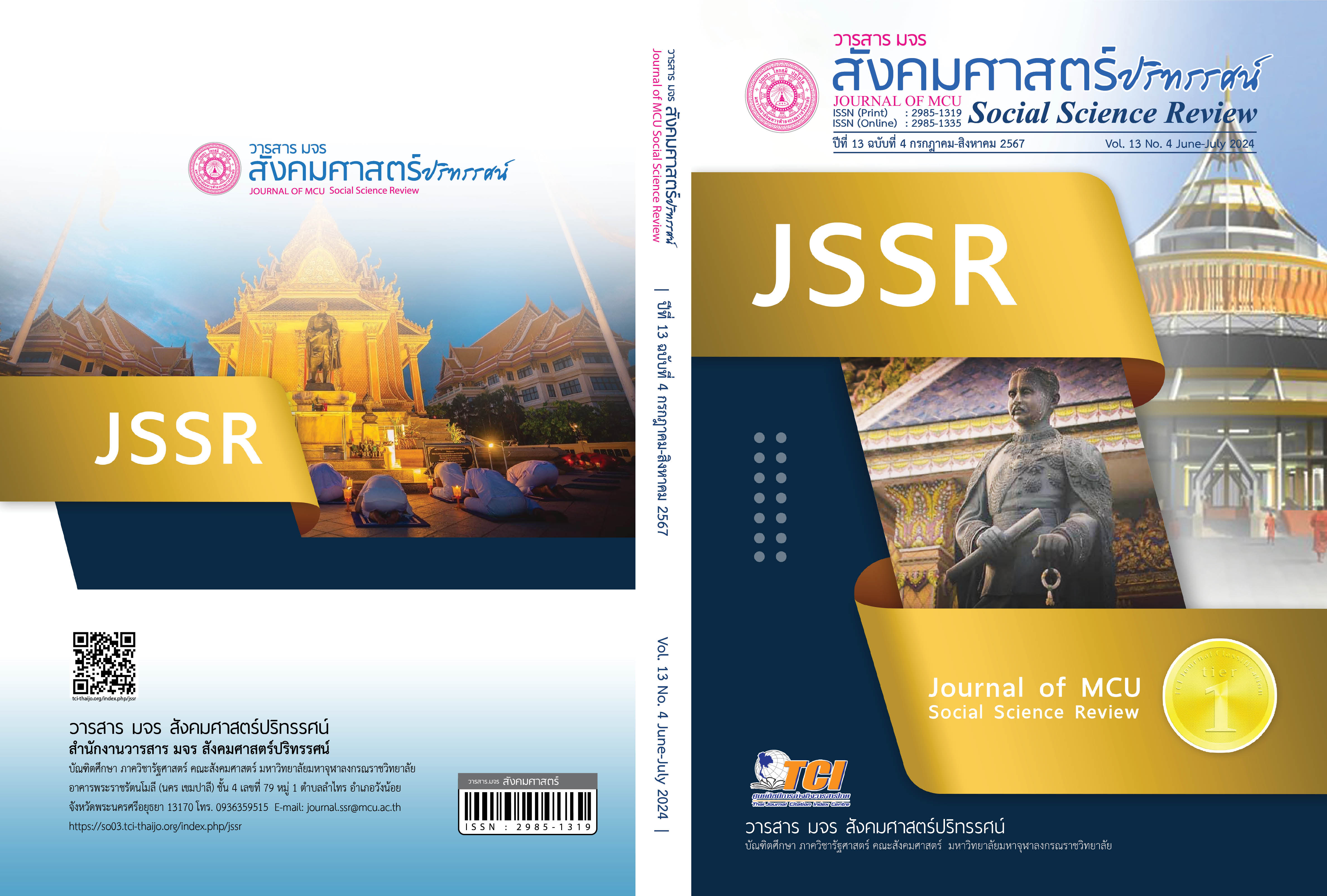ภาวะผู้นำดิจิทัลของผู้บริหารสถานศึกษาที่ส่งผลต่อสมรรถนะทางเทคโนโลยีสารสนเทศและการสื่อสารของครู สังกัดสำนักงานเขตพื้นที่การศึกษามัธยมศึกษากรุงเทพมหานคร เขต 1 กลุ่ม 6 ในยุค VUCA World
คำสำคัญ:
ภาวะผู้นำดิจิทัล, สมรรถนะทางเทคโนโลยีสารสนเทศและการสื่อสาร, ยุค VUCA Worldบทคัดย่อ
บทความวิจัยนี้มีวัตถุประสงค์ 1. ศึกษาระดับภาวะผู้นำดิจิทัลของผู้บริหารสถานศึกษา 2. ศึกษาระดับสมรรถนะทางเทคโนโลยีสารสนเทศและการสื่อสารของครู และ 3. วิเคราะห์ความสัมพันธ์เชิงทำนายของภาวะผู้นำดิจิทัลของผู้บริหารสถานศึกษากับสมรรถนะทางเทคโนโลยีสารสนเทศและการสื่อสารของครู กลุ่มตัวอย่างที่ใช้ในการวิจัย คือ ผู้บริหาร และครูผู้สอน สังกัดสำนักงานเขตพื้นที่การศึกษามัธยมศึกษากรุงเทพมหานคร เขต 1 กลุ่ม 6 จำนวน 246 คน เครื่องมือที่ใช้ในการวิจัย คือ แบบสอบถาม สถิติที่ใช้ในการวิจัย ได้แก่ ค่าร้อยละ ค่าเฉลี่ย ส่วนเบี่ยงเบนมาตรฐาน และการวิเคราะห์การถดถอยพหุคูณแบบขั้นตอน
ผลการวิจัยพบว่า 1. ภาวะผู้นำดิจิทัลของผู้บริหารสถานศึกษา โดยรวมและรายด้านอยู่ในระดับมาก 2. สมรรถนะทางเทคโนโลยีสารสนเทศและการสื่อสารของครู โดยรวมและรายด้านอยู่ในระดับมาก 3. ภาวะผู้นำดิจิทัลของผู้บริหารสถานศึกษาด้านการรู้ดิจิทัล และด้านการพัฒนาวิชาชีพ สามารถร่วมกันพยากรณ์สมรรถนะทางเทคโนโลยีสารสนเทศและการสื่อสารของครูได้ร้อยละ 61.8 อย่างมีนัยสำคัญทางสถิติที่ระดับ .05
เอกสารอ้างอิง
กระทรวงดิจิทัลเพื่อเศรษฐกิจและสังคม. (2562). นโยบายและแผนระดับชาติว่าด้วยการพัฒนาดิจิทัล เพื่อเศรษฐกิจและสังคม (พ.ศ. 2561-2580). สืบค้น 25 กันยายน 2565, จาก https://shorturl.asia/Icg5p
คมกริช สังขรัตน์. (2564). การพัฒนาแบบประเมินอิทธิพลของภาวะผู้นำดิจิทัลของผู้บริหารสถานศึกษาที่มีต่อประสิทธิผลของสถานศึกษา. นครราชสีมา: วิทยาลัยนครราชสีมา.
จันทนา แสนสุข. (2559). ภาวะผู้นํา Leadership. กรุงเทพฯ: บริษัท ทริปเพิ้ล กรุ๊ป.
จิราภรณ์ ปกรณ์. (2565). รูปแบบภาวะผู้นําดิจิทัลของผู้บริหารสถานศึกษา สังกัดสำนักงานคณะกรรมการการศึกษาขั้นพื้นฐาน. วารสารรัชต์ภาคย์, 48(16), 396-410.
ธัญชาติ ล้อพงค์พานิชย์. (2565). ภาวะผู้นำยุคดิจิทัลของผู้บริหารสถานศึกษาที่ส่งผลต่อสมรรถนะด้านเทคโนโลยีสารสนเทศในศตวรรษที่ 21 ของครูโรงเรียนเอกชน จังหวัดอุบลราชธานี. วารสาร มจร อุบลปริทรรศน์, 7(2), 579-591.
สุชญา โกมลวานิช. (2563). องค์ประกอบของภาวะผู้นำดิจิทัลของผู้บริหารสถานศึกษา สังกัดสำนักงานเขตพื้นที่การศึกษา มัธยมศึกษาเขต 23. การประชุมวิชาการเสนอผลงานวิจัยระดับบัณฑิตศึกษาแห่งชาติ มหาวิทยาลัยขอนแก่น, 1 (1): 1-8.
_____. (2564). ภาวะผู้นำดิจิทัลของผู้บริหารสถานศึกษาที่ส่งผลต่อสมรรถนะครูในศตวรรษที่ 21. วารสารวิจัย มข. (ฉบับบัณฑิตศึกษา) สาขามนุษยศาสตร์และสังคมศาสตร์, 9(2), 159-167.
สุรีรัตน์ รอดพ้น. (2564). การศึกษาภาวะผู้นำดิจิทัลของผู้บริหารโรงเรียนประชารัฐ สังกัดสำนักงานเขตพื้นที่การศึกษา ประถมศึกษาศรีสะเกษ เขต 1. วารสารการบริหารการศึกษาและภาวะผู้นำ, 39(1): 36-45.
สำนักงานคณะกรรมการการศึกษาขั้นพื้นฐาน. (2560). การพัฒนาระบบสื่อสารเพื่อส่งเสริมกระบวนการเรียนรู้ในสถานศึกษา. กรุงเทพฯ: สำนักงานคณะกรรมการการศึกษาขั้นพื้นฐาน.
Al Ajmi, M. K. (2022). The impact of digital leadership on teachers’ technology integration during the COVID-19 pandemic in Kuwait. International Journal of Information and Education Technology, 12(1), 24-31.
Giles, S. (2018). How VUCA Is Reshaping the Business Environment, And What It Means for Innovation. Retrieved September 24, 2022, from https://www.forbes.com
Krejcie, R. V., & Morgan, D. W. (1970). Determining sample size for research activities. Educational and Psychological Measurement, 30(3), 607-610.
Rubach, C. & Lazarides, R. (2021). Managing digital competencies in the 21st century: Developing and validating an instrument to assess teachers' digital competence. Retrieved October 26, 2022, from https://shorturl.asia/7gLnO
Sheninger, E. (2019). Pillars of Digital Leadership International Center for Leadership in Education. Retrieved September 27, 2022, from https://shorturl.asia/pYaAf
Sullivan, L. (2017). 10 Reasons Today’s Students NEED Technology in the Classroom. Retrieved October 19, 2022, from https://shorturl.asia/EqYzg
UNESCO. (2018). UNESCO ICT Frameworks for Teachers Version 3.0. France: UNESCO.
ดาวน์โหลด
เผยแพร่แล้ว
รูปแบบการอ้างอิง
ฉบับ
ประเภทบทความ
สัญญาอนุญาต
ลิขสิทธิ์ (c) 2024 วารสาร มจร สังคมศาสตร์ปริทรรศน์

อนุญาตภายใต้เงื่อนไข Creative Commons Attribution-NonCommercial-NoDerivatives 4.0 International License.
เพื่อให้เป็นไปตามกฎหมายลิขสิทธิ์ ผู้นิพนธ์ทุกท่านต้องลงลายมือชื่อในแบบฟอร์มใบมอบลิขสิทธิ์บทความให้แก่วารสารฯ พร้อมกับบทความต้นฉบับที่ได้แก้ไขครั้งสุดท้าย นอกจากนี้ ผู้นิพนธ์ทุกท่านต้องยืนยันว่าบทความต้นฉบับที่ส่งมาตีพิมพ์นั้น ได้ส่งมาตีพิมพ์เฉพาะในวารสาร มจร สังคมศาสตร์ปริทรรศน์ เพียงแห่งเดียวเท่านั้น หากมีการใช้ภาพหรือตารางหรือเนื้อหาอื่นๆ ของผู้นิพนธ์อื่นที่ปรากฏในสิ่งตีพิมพ์อื่นมาแล้ว ผู้นิพนธ์ต้องขออนุญาตเจ้าของลิขสิทธิ์ก่อน พร้อมทั้งแสดงหนังสือที่ได้รับการยินยอมต่อบรรณาธิการ ก่อนที่บทความจะได้รับการตีพิมพ์ หากไม่เป็นไปตามข้อกำหนดเบื้องต้น ทางวารสารจะถอดบทความของท่านออกโดยไม่มีข้อยกเว้นใดๆ ทั้งสิ้น





